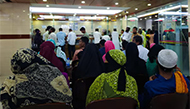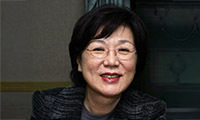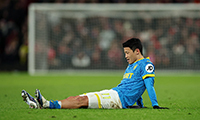Special Family Ties for Hansen’s Disease Sufferers
Imagine society pushing you away from family and friends by forcing you to live in confined isolation on a remote island separated from the general public.
All this because you had the innocent misfortune of contracting a misunderstood disease people have ignorantly stigmatized for millennia.
Similar to numerous situations in many countries around the world, Koreans affected by Hansen’s Disease (once commonly known as leprosy) were unwillingly segregated and required to move to Sorok Island.
Away from loved ones for years due to society’s prejudice, these people form special bonds amongst themselves and their newfound family ties do not follow bloodlines.
With May being the ``Family Month’’ in Korea, it is fitting that people affected by Hansen’s Disease and other individuals involved with this cause are celebrating their relationship as one common family.
Today (May 17), the nation marks the ``Day for Those Affected by Hansen’s Disease in Korea.’’ It is an annual event in which thousands of people congregate on Sorok Island not to mark their difference from society, but to recognize their sameness.
People who have been affected by Hansen’s Disease have a likeness in the sense that they have lived in society and experienced being mostly rejected by others both close and distant to them.
Lim Doo-sung, right, president of the Hanvit Welfare Association, talks about his experiences as a former Hansen’s Disease patient during a recent interview at his office in Tangsan-dong, Seoul. At left is the writer, Steve Kuack.
One such man is Lim Doo-sung who has overcome odds forced upon him by the public and has lived a life full of accomplishments.
Born in 1949, it was when he was an elementary school student that he first noticed what appeared to be a very mild skin irritation.
This area became numb before also spreading to other parts of his body.
Obviously growing more curious and concerned, he eventually visited a hospital for what he thought would be just a fairly routine visit to receive minor treatment for a skin ailment.
Although doctors did not initially diagnose it as Hansen’s Disease, another person at the hospital recognized the symptoms and this realization changed Lim’s life forever.
When he told his mother the situation, they both knew he had to go to Sorok National Hospital (SNH) and she instructed him to leave without telling anyone or it would risk the whole family becoming outcasts in their own community.
He knew very little about the disease, but he was aware of the dreaded stigma and prejudicial hate that people attach to it. However, not until arriving at the pier for the ferry to Sorok Island did it hit him that people would unjustly treat him as a second-class citizen.
Staff at the pier changed their tone upon realizing he was a patient and spoke in a blunt manner and segregated him from other passengers in a derogatory manner. It was the first, but certainly not the last time he would be ill-treated.
Not knowing what awaited him when he arrived on the island’s shore, he feared the unknown and the unexpected. Unlike the hospital’s foreign doctors, Korean doctors refused to touch his skin when they were testing him.
Instead, needles as well as stick-type instruments were used to check if parts of his body were sensitive or numb. To further distance themselves from contact with patients, hospital staff instructed patients themselves to draw blood from others when such tests were necessary.
Instead of resting for a faster recovery, patients were forced to work _ in road reconstruction or unloading food from ships _ for no pay on the basis that their treatment was sufficient compensation.
When not working, he was virtually limited to spending time with a dozen people in a cramped and dirty room. The medication showed steady results and after two years he was completely cured.
However, he was still forced to stay there on the false pretense that there were traces of the disease in his blood, but this was likely an excuse to keep him on the island to work.
Faced with bleak futures and limited options for change, some patients rejected the work while others attempted to escape. If they were caught then their punishment was confinement to a prison-like cell.
A large majority of people affected by Hansen’s Disease
who tried to escape drowned, so Lim thought his chances would be better by discreetly paying some fishermen to return with their boats under the cover of darkness to aid his chance for freedom.
He then missed the daily roll call and was re-captured by police who were informed by the hospital of his actions.
Although patients have a bond toward each other and mostly united against the authorities, some strong patients were hired to beat Lim nearly to death as punishment for his desperate attempt to return to normal society. Therefore, the authorities would be absolved of any responsibility.
His second attempt was successful and he returned to his hometown, but his medical history quickly spread to others.
His mother told him to settle in another place because if he stayed then the people would continually shun the family and he should not be a burden on them.
After escaping from Sorok Island, now he was sadly forced to flee from his family and hometown.
With basically nowhere to go, he moved to Kyungchon Resettlement Village. Similar to Sorok Island, these places are still segregated from local communities.
Further, SNH provided more food but no freedom; however, the resettlement village provided more freedom but no food.
His condition meant the government did not provide opportunities for education and the public did not hire people affected by Hansen’s Disease. Like other former patients he was forced to beg.
They felt there was no hope for a brighter future and they wanted to earn money in a more dignified manner. In this regard these people started raising livestock, but still faced difficult obstacles because the public did not buy items associated with wrongfully bad images of Hansen’s Disease.
After hiring ``regular people’’ to sell their goods to others, Lim was elected as their director in the Joint Livestock Association due to his notable business acumen.
His idea was to contact feed factories and propose to buy from them in return for them selling what the former patients had produced.
Just from the end of the 1970s to the mid-1980s, these people earned money in a respected manner while capturing an impressive 25 percent of the domestic egg market. Clearly, a significant accomplishment, which provided a self-reliant, improved economic status.
The Kyungchon village closed because the nearby city had expanded to surround the edge of it and other local residents were uncomfortable with such proximity. At the new Goeun Resettlement Village, Lim’s leadership skills remained evident and he became the village president. He now serves as president of the Hanvit Welfare Association, Korea’s only non-government organization dedicated to representing those affected by Hansen’s Disease by attempting to advance their rights.
Although people might think Lim’s successful accomplishments reflect that integration and normalcy in society is gradually improving, complete normalcy is still vastly inadequate.
For example, if people have signs that they were affected by Hansen’s Disease then they are regularly forced out of public saunas, neglected at hospitals, refused haircuts and disregarded by supposed friends.
Even now he feels like a fugitive running away from his past medical condition to the point that he and his family never mention it to their neighbors or classmates and others.
Little did he know that a small skin irritation would dramatically grow into something that would fundamentally alter his life.
Lim rightfully emphasizes that people affected by Hansen’s Disease have been cured just like people cured from other diseases.
A painful thing is that these people feel society forces them to wear intangible masks about their past condition. Governments must educate people by revealing the truthful facts about the disease so these people can shed their intangible masks that shield them from a repressive society.
As they mark their sameness as one unique family, they should be able to live normally and be treated respectfully like others in society.
스마터리빙
more [ 건강]
[ 건강]이제 혈관 건강도 챙기자!
[현대해운]우리 눈에 보이지 않기 때문에 혈관 건강을 챙기는 것은 결코 쉽지 않은데요. 여러분은 혈관 건강을 유지하기 위해 어떤 노력을 하시나요?
 [ 건강]
[ 건강]내 몸이 건강해지는 과일궁합
 [ 라이프]
[ 라이프]벌레야 물럿거라! 천연 해충제 만들기
 [ 건강]
[ 건강]혈압 낮추는데 좋은 식품
[현대해운]혈관 건강은 주로 노화가 진행되면서 지켜야 할 문제라고 인식되어 왔습니다. 최근 생활 패턴과 식생활의 변화로 혈관의 노화 진행이 빨라지고
사람·사람들
more많이 본 기사
- ‘함께 가는 저녁길’· ‘톰과제리’ 성우 송도순 별세
- “라면, 못 끊겠다면 ‘이거’라도 넣어라”
- “트럼프 리조트의 마사지사들, 엡스타인에 방문 서비스 제공”
- 트럼프 “시카고·LA 등서 軍철수…범죄늘면 더 강하게 재배치”
- ‘붉은 말의 해’ 동해안 해맞이객 북적… “건강·평안” 소망 기원
- 미국 정부, TSMC에도 美반도체장비 中공장 반입 허가
- 美, 베네수 석유 사업 회사·선박 제재… “마두로 압박 계속”
- 재외동포, 2년 새 7만5천명 줄었다…181개국에 700만 명 거주
- 美국무부 “韓정통망법에 중대 우려…美플랫폼기업에 부정적”
- 트럼프팀, 우크라·유럽 3국과 종전 논의… “새해에도 지속”
- 뉴욕증시 주요지수 3년 연속 상승…S&P500 연간 16%↑
- ■ 발언대 / 2026년이 전성기의 시작인 이유
- 새해엔 평화 찾아올까…지구촌 희망 찬 신년 맞이
- 알고보니 ‘완전식품’인 고구마의 놀라운 효능
- 낸시랭, 사채 빚 15억 떠안았다..오열 고백 “좀비떼처럼 뜯어 먹어”
- “치매에 치즈가 좋대서 맨날 먹었는데”… 고지방 주의
- 원·달러 환율… 연평균 기준 ‘역대최고’ 마감
- 中왕이 “日일부세력, 역사 후퇴 시도…韓, 올바른 입장 취해야”
- 美, 韓정통망법에 ‘검열·빅테크 규제’ 우려…외교갈등 비화하나
- 폭설 속 산행 비극… 마운트 볼디서 3명 조난 사망
- 코스트코행 40만달러 랍스터 도난당해...‘스푸핑, 위장트럭’까지…워싱턴주 등 미 화물절도 극성
- 시애틀 최고 레스토랑이 코스요리를 5달러에?...캔리스 개업 75주년 축하행사로 1950년 가격 제공 ‘화제’
- 백악관 “미네소타 이어 他민주당 州들… 1
- 트럼프, 집권2기 첫 법안 거부권… ‘보복성’ 권한 행사 논란
- “메타, 사기광고 규제 피하려 검색결과 조작…대응지침도 마련”
- 미국내 한인 225만명…다소 줄어...재외동포 181개국에 700만명, 2년새 7만5,000명 감소
- 새해에도 성금 물결 이어져 ...이수잔ㆍS독자 1,000달러씩. 동덕여고 500달러
- 오픈AI 직원, 올해 평균 150만 달러치 주식 받아…역대 빅테크 최고
- ‘첫 무슬림 뉴욕시장’ 맘다니, 취임… 1
- ‘상간녀 의혹’ 숙행, 리액션만 간신히 건졌다..무대는 통편집
- 시애틀 다운타운 상권 명암 엇갈려...의류할인점 ‘로스’ 폐점, 노스트랙 이전
- 지방세 공제한도 1만→4만달러로 상향 1
- 조세호 ‘조폭 연루설’ 털고 빠른 복귀 수순.. ‘도라이버’ 시즌4 합류
- 말리·부르키나파소 “미국인 오지마”…美입국 금지에 맞불
- “추신수는 지울 수 없는 발자취 남겼다” 美 야구기자, 명예의 전당 투표서 ‘CHOO 선택’ 이유 밝혔다
- 불체자 의심 메디케이드 정보 공유 허용
- 가주 판매 간 소고기 ‘이콜라이’ 오염
- LA 북쪽 테혼 카지노서 하룻새 10만불 ‘연속 잭팟’
- 한국팀 뛸 곳인데… 강력범죄 ‘충격’
- [한인 은행장 신년사 통해 본 비전과 경영 목표] “끊임없는 변화와 혁신으로 안정적 성장 도모”
- ‘억’ 소리 나는 ‘개념 부부’..신민아♥김우빈·손예진♥현빈
- ■ 제언 / 한인회 사태 신속한 해결을
- 신년 연휴 폭풍우… 비 3인치 온다
- [인터뷰-문경환 한인회장] “캔자스, 이민자들에 제2의 기회의 땅”
- 22개주서 생굴 먹고 살모넬라균 감염
- ‘아듀~ 2025!’… 희망찬 새해로
- “10년간 모든 이민 전면 금지?” 황당 주장
- [연말 기획] 한국계 혼혈들 두각… 각 분야에서 ‘맹활약’
- 제야의 종으로 ‘붉은 말의 해’ 시작… “행복 오는 2026년 되길”
- 브라이언트팍서 외국인 관광객 묻지마 칼부림
1/5지식톡

-
 미 육군 사관학교 West Poin…
0
미 육군 사관학교 West Poin…
0https://youtu.be/SxD8cEhNV6Q연락처:wpkapca@gmail.comJohn Choi: 714-716-6414West Point 합격증을 받으셨나요?미 육군사관학교 West Point 학부모 모…
-
 ☝️해외에서도 가능한 한국어 선생님…
0
☝️해외에서도 가능한 한국어 선생님…
0이 영상 하나면 충분합니다!♥️상담신청문의♥️☝️ 문의 폭주로 '선착순 상담'만 진행합니다.☎️ : 02-6213-9094✨카카오톡ID : @GOODEDU77 (@골뱅이 꼭 붙여주셔야합니다…
-
 테슬라 자동차 시트커버 장착
0
테슬라 자동차 시트커버 장착
0테슬라 시트커버, 사놓고 아직 못 씌우셨죠?장착이 생각보다 쉽지 않습니다.20년 경력 전문가에게 맡기세요 — 깔끔하고 딱 맞게 장착해드립니다!장착비용:앞좌석: $40뒷좌석: $60앞·뒷좌석 …
-
 식당용 부탄가스
0
식당용 부탄가스
0식당용 부탄가스 홀세일 합니다 로스앤젤레스 다운타운 픽업 가능 안녕 하세요?강아지 & 고양이 모든 애완동물 / 반려동물 식품 & 모든 애완동물/반려동물 관련 제품들 전문적으로 홀세일/취급하는 회사 입니다 100% …
-
 ACSL 국제 컴퓨터 과학 대회, …
0
ACSL 국제 컴퓨터 과학 대회, …
0웹사이트 : www.eduspot.co.kr 카카오톡 상담하기 : https://pf.kakao.com/_BEQWxb블로그 : https://blog.naver.com/eduspotmain안녕하세요, 에듀스팟입니다…
케이타운 1번가
오피니언
 정숙희 논설위원
정숙희 논설위원샴페인, 마지막 날과 첫날을 위하여
 조지 F·윌 워싱턴포스트 칼럼니스트
조지 F·윌 워싱턴포스트 칼럼니스트 [조지 F. 윌 칼럼] 저무는 2025년에 안도의 한숨
 김동찬 시민참여센터 대표
김동찬 시민참여센터 대표 [미국은 지금] 책임 있는 자본 없으면 커뮤니티 미래도 없다
 성영라 수필가 미주문협 부이사장
성영라 수필가 미주문협 부이사장 [수요 에세이] 다시, 제자리로 돌아와서
 신경립 / 서울경제 논설위원
신경립 / 서울경제 논설위원 [만화경] 경영자의 ‘문제적’ 사과
 문태기 OC지국장
문태기 OC지국장 한인 정치력 업그레이드 기대
 민경훈 논설위원
민경훈 논설위원세계 역사를 바꾼 동물
 박홍용 경제부 차장
박홍용 경제부 차장 한인사회가 주목해야 할 새해 경제
 박영실 시인·수필가
박영실 시인·수필가 [화요칼럼] 피드백
1/3지사별 뉴스

지방세 공제한도 1만→4만달러로 상향
2026년 새해에도 뉴욕과 뉴저지 한인들의 일상에 크고 작은 영향을 미치는 다양한 규정과 법규가 새롭게 바뀌게 된다. 당장 1일부터 뉴욕시 최…
■ 사고- 한동대·뉴욕한인청소년센터 국제여름캠프

2025 워싱턴지역 10대 뉴스
다사다난했던 2025년이 하루만 남겨둔 채 역사의 저편으로 저물고 있다. 올해의 가장 큰 뉴스는 트럼프 2기 행정부 출범과 함께 몰아친 이민 …
내년 1월부터 달라지는 MD 법안들

셀폰 위치추적, 납치된 딸 살렸다… ‘부모 통제’ 기능 활용
스마트폰에서 자녀의 위치를 확인할 수 있는 ‘부모 통제(parent control)’ 위치 추적 기능의 도움으로 납치됐던 청소년들이 잇달아 구…
[새해부터 이렇게 달라진다] 최저임금 또 오르고… 유급 병가는 더 확대

오늘 하루 이 창 열지 않음 닫기 





















































.png)


댓글 안에 당신의 성숙함도 담아 주세요.
'오늘의 한마디'는 기사에 대하여 자신의 생각을 말하고 남의 생각을 들으며 서로 다양한 의견을 나누는 공간입니다. 그러나 간혹 불건전한 내용을 올리시는 분들이 계셔서 건전한 인터넷문화 정착을 위해 아래와 같은 운영원칙을 적용합니다.
자체 모니터링을 통해 아래에 해당하는 내용이 포함된 댓글이 발견되면 예고없이 삭제 조치를 하겠습니다.
불건전한 댓글을 올리거나, 이름에 비속어 및 상대방의 불쾌감을 주는 단어를 사용, 유명인 또는 특정 일반인을 사칭하는 경우 이용에 대한 차단 제재를 받을 수 있습니다. 차단될 경우, 일주일간 댓글을 달수 없게 됩니다.
명예훼손, 개인정보 유출, 욕설 등 법률에 위반되는 댓글은 관계 법령에 의거 민형사상 처벌을 받을 수 있으니 이용에 주의를 부탁드립니다.
Close
x